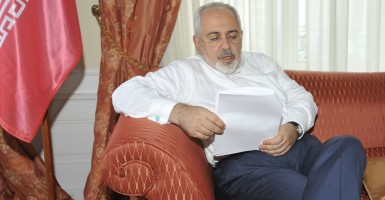Once a major diplomatic agreement is inked, the world typically reacts by holding its breath, waiting to see if it will all turn out alright. Some deals, like the Munich Pact, crumble quickly. Others, like the Camp David accords, hang in there. But, rarely has there been a deal like the one reached in Vienna this week—a deal in which all the nations most closely affected by it, including Iran, pretty much start out knowing it won’t end well.
All this will weigh heavily on the U.S. Congress as it preps for a vote on the pact. In particular, they will struggle with how to reconcile the promise that it will manage Iran’s heretofore unmanageable nuclear program with the fact that it does nothing to change the conditions that have made that impossible.
Even if all the countries concerned ratify the results of the P5+1 talks, the red flags worrying most of the capitals in the Middle East will be flying as high as they were before the deal was signed. There are four of them.
The whole neighborhood will race to go nuclear. The number one concern with the way this deal was structured was that it was bound to accelerate nuclear proliferation. Iran has violated its obligations under the Nuclear Nonproliferation Treaty (NPT) and repeatedly thumbed its nose at oversight from the International Atomic Energy Agency (IAEA). Yet it winds up getting a great deal under the agreement—better, in fact, than the deal the United States gives its friends and allies through the 123 Civil Nuclear Agreements. If regional powers like Turkey, Egypt and Saudi Arabia believe that the likelihood of Iran getting a weapon is undiminished and the penalty for becoming a nuclear breakout power is plummeting, then the deterrent for them to cross the nuclear threshold drops as well.
Tehran gets to keep its vast nuclear infrastructure and its missile program. Other regional powers are likely to race to nuclear, in part because the deal does nothing to scuttle Iran’s plans to build a weapon. The administration’s pitch is that the deal slows down Iran’s program, leaving plenty of time for “early warning” of a nuclear breakout. That’s cold comfort for Tehran’s neighbors. What’s freaked them out is knowing that Iran will eventually put a nuclear warhead on a missile—and this deal won’t stop that. Further, even if the administration does receive early warning (a dubious promise at best), it has never indicated what—if anything—it would do about it. Indeed, these promises from Iran only confirm the obvious: that the regime definitely has nuclear weapons ambitions. After all, why have a massive ballistic missile program and secret military nuclear facilities if the plan isn’t to build nuclear weapons?
Sanctions relief will make the region far less safe. People will argue the numbers, but the sanctions relief and the renewed ability to sell more oil on the open market could wind up bringing $300-$400 billion into the Iranian economy. As in any thriving kleptocracy, that money will be funneled through the hands of the regime, whose leaders will use it to tighten their grip on the Iranian people and fund the most aggressive and destabilizing foreign policy outside of ISIS. Essentially, the deal will pay for undermining U.S. policy and interests throughout the region.
The deal is temporary, by design. Even the White House doesn’t claim it will permanently keep Iran from getting a bomb. So, what’s the point? Obama can’t even guarantee it will outlive his presidency. After a couple of years of cashing in on sanctions relief, Tehran might just walk away.
The Oval Office insists that there are only two choices: this deal or war. But the choices are neither that limited, nor that simple. This deal is not the antidote to war. Rather, it makes increased conflict all the more likely, as a newly enriched and emboldened Iran increases its destabilizing activities throughout the region and its threatened neighbors pursue more extreme measures for self-preservation.
Sadly, the administration is so invested in its “negotiations above all” foreign policy model, it won’t even consider alternative approaches that would pressure the Iranian regime into reining in its bad behavior.





























